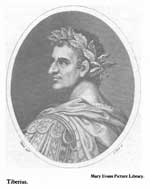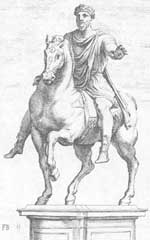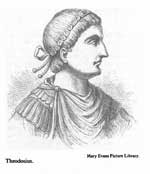George Dunea
Chicago, IL
British Medical Journal, Volume 294, 18 April 1987
“Many a physician has slain a king!” the emperor Hadrian shouted aloud as he lay on his deathbed. But Augustus when he was near death gathered his friends to ask if, in the manner of actors, he deserved applause for having played well his assigned role in the human comedy;1 and Vespasian, weak to the point of fainting during his last illness, refused to lie down, insisting that an emperor must die standing.1 Attila, the Scourge of God, terrified his bride by suffocating on his wedding night after vomiting an immense torrent of blood.2 Alaric, the Visigoth king who sacked Rome in AD 426, forever foiled the curiosity of posterity by ordering a river to be diverted to hide his bones at the bottom. The emperor Claudius was probably killed by his wife Agrippina with a dish of poisoned mushrooms.2-4

It was the revival on television of I Claudius that stimulated me to turn to some old notes that I had made on the final illnesses of those few rulers in antiquity who escaped the violence of their times and were neither slain in battle nor murdered or executed. Yet the details given by the ancient historians are scanty and difficult to interpret. This is particularly so for the Greeks, even for the well described plague of Athens, which has recently been attributed to new candidates such as Rift Valley fever or influenza with toxic shock from staphylococcal superinfection.5 Some kings were just assumed to have died of old age. Such was the case of Agesilaus, who had reached the age of 83 when he died on a military campaign in Egypt and whose body was shipped back to Sparta enclosed in wax.6 His former rival, Agesipolis, must have had some infectious disease, for Xenophon describes him burning with fever and longing for the shady arbours and cool limpid waters of the shrine of Dionysus, where he died after seven days. Nicias, leader of the ill fated Athenian expedition to Sicily, seemingly had a kidney stone;6 and Alexander the Great died at Babylon from malaria, amoebiasis, pneumonia, or poisoning.3-6
Of the legendary kings of Rome, Romulus vanished during a storm, taken up to the sky by the gods or perhaps killed by jealous senators. Numa, his successor, died when he was 80 of “old age by gradual and gentle decline.”6 Tullus was struck by a thunderbolt for angering Jupiter; the other kings died in exile or were murdered.

Moving to the age of the dictators, we find Marius dying during his seventh consulship after “giving himself to drinking deep and besotting himself at night in a way most unsuitable for his age,” then taking to his bed and dying after seven days possibly of pneumonia.6 Quite uninterpretable is the disease of his rival, Sulla, who in 78 BC acquired a “creeping illness with ulceration of the bowels” from drinking night and day on couches with actresses, musicians, and dancers. Plutarch describes how “the corrupted flesh broke into lice” that kept swarming out in increasing numbers despite the efforts of his attendants, who worked night and day trying to overcome them with baths and ablutions.6
Augustus, the first Roman emperor, was 76 when he developed a brief diarrhoeal illness and was blessed with a swift and easy death such as he had always longed for;1 but some suspected foul play because his wife, Livia, surrounded the house and continued to issue favourable bulletins until the succession was settled.4 Of his successors, at least 20 may have had lead poisoning from drinking wine stored in lead pots, according to Jerome Nriagu, a geochemist impressed by the high incidence of gout and bizarre personality disorders among the early Roman emperors. Of these, Tiberius lived in seclusion on Capri until he was 78, when he became weak and developed a pain in the side. He lingered on for some time and his eventual death in AD 37 has been variously attributed to his being deprived of food, smothered under a pillow or pile of clothes, or given a slow poison by Caligula.1,4 Vespasian, the first Flavian emperor, died at the age of 69 not from his usual gout but with fever and diarrhoea, perhaps “from too free use of the cold waters.”1 His son, Titus, died young from what may have been malaria, for he contracted a fever while visiting Sabine territory;1 but some think that his brother, Domitian, hastened his death by pretending to attempt a cure by placing him in a chest packed with snow.1
Eat, drink, and be done for
After Nerva, who died from unknown causes, came Trajan, who at the age of 64 developed oedema and suffered a paralytic stroke.3,7 Though he himself suspected poison, he may well have had hypertensive vascular disease and heart failure. But the historian Dio makes the perplexing statement that some attributed his trouble to the blood that descends every year into the lower part of the body being checked in its flow,7 prompting a modern writer to diagnose carcinoma of the rectum with malignant ascites.3 His successor, Hadrian, seems to have died from chronic glomerulo-nephritis, having had nosebleeds and severe anasarca.3,7,8 From this oedema he would be relieved by “certain charms and magic rites” but then “he would be filled with water again.” Dejected, he asked one of his slaves to stab him at a colored spot drawn by his physician below the nipple so that he might perish quickly.7 Subsequently, according to Dio, he abandoned his careful regimen (? low salt) and by indulging in unsuitable foods (? high in potassium) met his death.7 The virtuous Antoninus Pius died aged 75, “having eaten too freely some Alpine cheese at dinner.” He vomited during the night, developed a fever, and became rapidly delirious from what may have been some form of food poisoning.8 Some think that the death of Marcus Aurelius, the philosopher emperor, was hastened because he foresaw that his son would turn out to be a cruel tyrant. He became ill during a campaign against the Sarmatians. “Being eager to die, he refrained from eating and drinking and so aggravated the disease. ‘Why do you weep for me,’ he said to his friends on his deathbed, ‘instead of thinking about the pestilence and about the death which is the common lot of all of us?’”8

Septimus Severus, the emperor who had been all things but to no avail,2 died aged 67 at York on a campaign against the Britons, “overcome by a most grievous disease.”8 At least 20 of his successors suffered violent deaths—excluding only Claudius, who died of the plague in AD 270 while fighting the Goths; Tacitus, who grew weak in mind and body in old age;2 and Carus, who died of some unknown disease or was struck by lightning.2-8
Diocletian, one of the few rulers in history to abdicate at the height of power, died of old age or perhaps committed suicide.
His associate and successor, Galerius, developed a perplexing “very painful and lingering disorder. . . .His body, swelled by an intemperate course of life to unwieldy corpulence, was covered with ulcers, and devoured by innumerable swarms of the insects which have given their name to a most loathsome disease.”2
Last words
The first Christian emperor, Constantine, died at the age of 64 in AD 337 after a short illness, having tried in vain to regain his strength by the use of warm baths.2 His son, Constantius, died in AD 361 at the age of 44, his death being announced by an omen—a corpse of a man with his head torn off and pointing towards the sun. “The extreme heat of the fever,” writes Ammianus Marcellinus, “so inflamed his veins that his body could not even be touched, since it burned like a furnace, and application of remedies proved useless; as he breathed his last he lamented his end . . . then the death-rattle began and he was silent.”9
Julian the Apostate was injured by a Persian spear lodging in “the inferior part of his liver” and died while engaged in a metaphysical argument about the nature of the soul.2 Jovian, his general and successor, was found dead in bed after a “plentiful, perhaps intemperate supper,” the cause being ascribed to an “indigestion occasioned by the quantity of the wine or the quality of the mushrooms which he had swallowed in the evening,”2 or perhaps because “his head was swollen from the burning of a great amount of charcoal” and “he was unable to endure the unwholesome odour of a recently plastered bedroom”9 —possibly carbon monoxide poisoning.
Jovian’s successor, Valentian, was angrily upbraiding the barbarian Alemani for their treachery when “a large blood vessel suddenly burst in his body” and he fell into the arms of his attendant as if struck by lightning. He was speechless and suffocating, his face tinged with a fiery flush. Then suddenly he turned pale and began to sweat; a physician tried to open a vein, but no blood could be drawn. Jovian tried to speak, his strength failed him, his body was covered with livid spots, and he breathed his last.2-9 The last emperor before the division of the empire, Theodosius, was not 50 when he developed severe oedema. This has been attributed by some to the fatigues of war, by others to “the indulgence of ease and dissolution,”2 but presumably it was caused by some disease of the heart, kidneys, or liver—which is as far as our speculations can take us.
References
- Suetonius. The lives of the twelve caesars. Transl J Gavorse. New York: Modern Library, 1931.
- Gibbon E. The decline and fall of the Roman empire. New York: Modern Library.
- Kanngiesser F. On the causes of death of Alexander the Great and the Roman emperors Claudius, Trajan, and Hadrian. St Petersburger Medizinische Wochenschrift 1911;36:584-5.
- Tacitus. The annals. New York: Modern Library.
- Holladay AJ. The Thucydides syndrome. Another view. N Engl J Med 1986,315:1170-3.
- Plutarch. The lives of the noble Grecians and Romans. Transl J Dryden. New York: Modern Library.
- Dio. Roman history. Vol 8. Transl E Cary. London: Heinemann; Cambridge, Massachusetts: Harvard University Press, 1961. (Loeb Classical Library.)
- Anonymous. Scriptores historiae Augustae. London: Heinemann; Cambridge, Massachusetts: Harvard University Press, 1967. (Loeb Classical Library.)
- Ammianus Marcellinus. The history. London: Heinemann; Cambridge, Massachusetts: Harvard University Press, 1963. (Loeb Classical Library.)

Leave a Reply